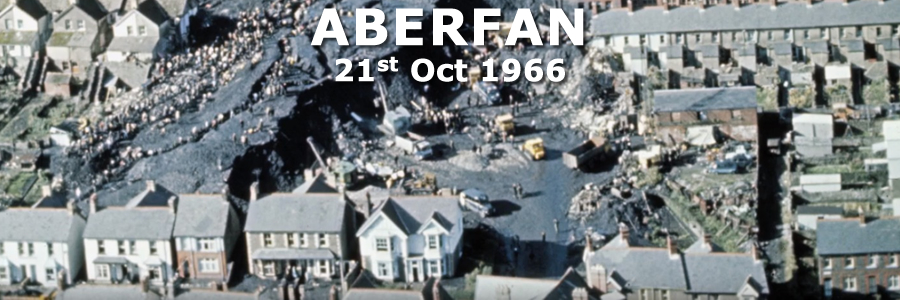Aberfan is a sleepy colliery village situated on the western side of the Taff Valley, approximately, 4mls (6kms) south of Merthyr Tydfil in West Wales.
In 1996 the population was about 5,000 men women and children. Most of the adults were employed in the coal industry.
Since the first Merthyr Vale mine was dug in 1869, the spoil from the mines was deposited in the valley.
There were 7 spoil tips that overlooked the village, of which on Tip 7 was still being used.
Tip stability is greatly affected by water conditions. Tips 4,5 and 7 had been sited on streams or springs running down the hillside.
During the first 3 weeks of October 1966, there had been over 6½” (170mm) of rainfall, nearly half of which fell in the third week.
During the night of the 20-21st October, the peak of Tip 7 subsided about 10ft. This movement was spotted and reported to the colliery by the mine workers.
At 09:15am, the catastrophic collapse of spoil tip No 7 began.
140,000cubic yards (110,00cubic metres) or approx 250,000 tons of spoil flowed downhill at 20miles per hour (30kph) toward the village.
The spoil slid over 700yard (64mts) down the side of the mountain, destroying 2 farm cottages and killing the occupants.
It then surged across the canal and the railway tracks into the village.
The avalanche struck Pantglas Junior School, demolishing most of the building and filling the classrooms with thick mud, sludge and rubble.
The teachers had just began to record the children’s attendance the register, when the landslide struck.
109 children and 5 teachers were killed in the school.
The next-door secondary school was also damaged and a further 18 houses in the village were destroyed.
Mud and water flooded other houses in the area, forcing many people to evacuate their homes.
In total 146 Adults and Children lost their lives.
An official inquiry was set up and the report placed the blame squarely on the Nation Coal Board. (NCB).
The NCB Chairman, Lord Robens, was criticised for making misleading statements to the enquiry and not providing clarity about what the NCB knew of water streams and springs on the hillside.
Neither the NCB, nor any of its employees were prosecuted and the organisation wasn’t fined or censured in any way.
It was a total whitewash, by the Government of the day and the National Coal Board.
The Aberfan Disaster Memorial Fund (ADMF) was set up, on the day of the disaster. It received 88,000 contributions and totaled £1.75m (£30m equivalent in 2016).
The remaining spoil tips were eventually removed, only after a lengthy fight by the Aberfan residents, against much resistance from the NCB and the government over the cost.
Eventually, the government paid for the tips to be cleared, but only after they forced a contribution of £150,000 from the ADMF. (Nearly 10% of the Fund).
This amount was returned to the fund in 1997 by the British Government, but with no interest added.
In 2007 the Welsh Government donated £1.5million to the fund and a further £500,000 to the Aberfan Education Charity.
The inquiry team wrote “…that the Aberfan Disaster could and should have been prevented…”
On this the 50th Anniversary of the tragedy, we remember the 146 children and adults who were killed.
These people were not killed by “wickedness but by ignorance, ineptitude and a failure of communications.
Ignorance on the part of those charged, at all levels, with control and daily management; bungling ineptitude on the part of those had the duty of supervising and directing them; and failure on the part of those having knowledge of the factors which affect tip safety and to communicate that knowledge to see it was applied.” (Inquiry Report 1967; Page 11)
We must never forget the Aberfan Disaster.

